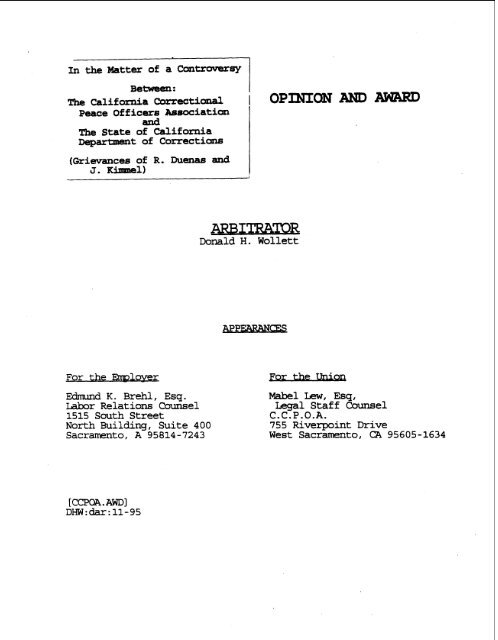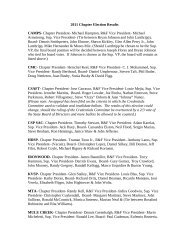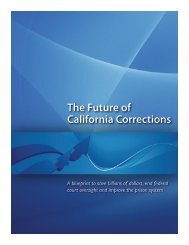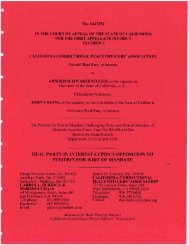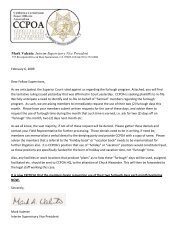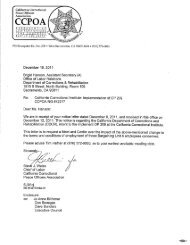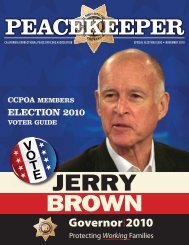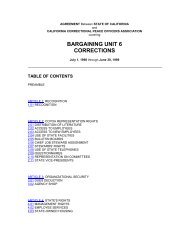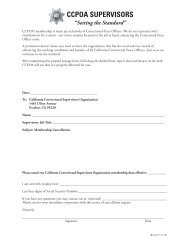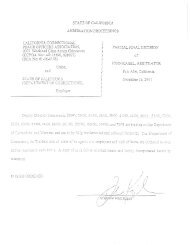OPINION AND - California Correctional Peace Officers Association
OPINION AND - California Correctional Peace Officers Association
OPINION AND - California Correctional Peace Officers Association
Create successful ePaper yourself
Turn your PDF publications into a flip-book with our unique Google optimized e-Paper software.
In the Matter of a Contruv@rsy<br />
Between :<br />
he <strong>California</strong> correctid<br />
<strong>Peace</strong> <strong>Officers</strong> <strong>Association</strong><br />
and<br />
The State of <strong>California</strong><br />
Department of Corrections<br />
(Grievances of R. Duenas and<br />
J. Ichmnel)<br />
I<br />
<strong>OPINION</strong> <strong>AND</strong><br />
Donald H. Wollett<br />
Edmund K. Brehl, Esq.<br />
Labor Relations Counsel<br />
1515 South Street<br />
North Building, Suite 400<br />
Sacramento, A 95814-7243<br />
Mabel Lew, Esq,<br />
Legal Staff Counsel<br />
C.C.P.O.A.<br />
755 Riverpoint Drive<br />
West Sacramento, CA 95605-1634
The hearings in this matter stretched over a year and a<br />
half, beginning on December 6, 1993 and ending April 28,<br />
1995.<br />
The parties agreed that the issue is as follows:<br />
"Did the Department of Corrections<br />
violate Section 13.05 of the Collective<br />
Bargaining Agreement by the actions<br />
described in the two grievances of<br />
Joseph Kinmel and the two grievances of<br />
Ralph Duenas; if so, what should be the<br />
remedy
The sole issue submitted to the Arbitrator is on the<br />
merits. If the Arbitrator finds the grievances meritorious,<br />
he is directed by agreement of the parties to<br />
remand the matter to them for consideration of the<br />
appropriate remedy. The parties also directed the<br />
Arbitrator to retain jurisdiction to resolve remedial<br />
questions the parties are unable to work out. (TR @ 7-8)
PERTINENT<br />
Section 13.05(a) reads as follows:<br />
llEmployees in Bargaining Unit VI shall<br />
be assigned voluntary overtime by seniority<br />
except where precluded by operational<br />
needs of the departments or in<br />
emergency situations. ... 11<br />
Section 13.05(b) reads as follows:<br />
"Each Warden/Superintendent will establish<br />
means by which a Bargaining Unit<br />
VI employee may sign-up for an wer-time<br />
shift. ... It<br />
Section 13.05(c) reads as follows:<br />
"Due to the limited number of staff in<br />
camps, camps shall be excluded from the<br />
provision. Overtime at camps shall be<br />
on a rotational basis."
Article 4.01 (a):<br />
"Except as acpressly abridged by any<br />
provision of the Agreement, the State<br />
and Departments reserve and retain all<br />
of their normal and inherent rlghts with<br />
respect to management of their affairs<br />
in all respects in accordance with their<br />
responsibilities, whether exercised or<br />
not, including but not limited to . . .<br />
the assignment of duties and the<br />
schedule of work time and the work<br />
hours. . . . and otherwise to take such<br />
measures as the employer may determine<br />
to be necessary for the orderly,<br />
efficient and economical operation of<br />
the Departments of Youth Authority and<br />
Corrections."<br />
Article 11.17 (a):<br />
"Re-entry standby is defined as an<br />
assignment whereby a Parole Agent must<br />
remain physically and geographically
able to respond when contacted by<br />
telephone or electronic paging device to<br />
the re-entry facility. This assignment<br />
shall be in addition to the went's<br />
normal work schedule. The State will<br />
determine when and where re-entry<br />
standby assignments, and back-up<br />
assignments will be made."
Joseph Kim1 and Ralph Duenas are long-time enployees of<br />
the Department of Corrections. Kimn\ells hiring date is<br />
February 17, 1986; Duenas' hiring date is August 28,<br />
1971. In 1987, both of the grievants volunteered and<br />
were assigned to surveil the activities of parolee Larry<br />
Singleton. This was the first 24-hour surveillance case<br />
in State history shared by agents who volunteered within<br />
Region I1 and received paid overtime.<br />
In January of 1990, parolee Charles Rothenberg was placed<br />
under 24-hour surveillance. This was the second non-case<br />
load special assignment in Region 11. Kimnel and Duenas<br />
volunteered for the assignment by making requests to<br />
their unit supervisors and other appropriate management<br />
personnel. Their requests were denied. Both Parole<br />
Agents filed grievances.<br />
Kiml' s first grievance was April 30, 1990.<br />
It was<br />
denied by Steve Schroeder on May 7, 1990 on two grounds:
Seniority does not apply because the operational<br />
needs of the Department take precedence;<br />
Management has the right to assign Agents based<br />
'<br />
on "perceived need. If (Union Exhibit 1 )<br />
Kimells second grievance was on August 7, 1990.<br />
Schroeder denied it on August 15, 1990 on the same<br />
ground. (Union Exhibit 3 )<br />
Duenasl first grievance was on February 16, 1990. It was<br />
denied by Deborah Star, Field Parole Administrator, North<br />
Bay, on the ground that the surveillance team project is<br />
a special assignment "whose hours of work, location,<br />
duration and staff needs preclude the following of<br />
seniority. (Un. Ex. 2 )<br />
Duenas' second grievance was on August 8, 1990. It was<br />
denied by Schroeder, in essence, confirming Starrt s<br />
decision. (Union Exhibit 4)<br />
Operations Coordinator, Steve Schroeder, testified that<br />
the criteria for the overtime assignment were as follows:
* The applicant is a non-smoker<br />
* Lives within 35 miles of the watch site<br />
* Carries a gun<br />
* Has permanent status as a Parole Agent<br />
* Has received the concurrence of his supervisor<br />
The initial surveillance of Rothenberg ended on September<br />
10, 1990 when he violated his parole and was returned to<br />
Pelican Bay State Prison. He was released again on<br />
parole on May 8, 1991 and was placed under surveillance<br />
again until September 21, 1993.<br />
In the case of Kinanel, Assistant Administrator Schroeder<br />
took the position that flmanagement has the right to<br />
assign agents based on perceived need. It (Union Exhibit<br />
1)<br />
Kim1 was also told that he was disqualified because<br />
selection was restricted to "staff who can follow cornman&<br />
and orders explicitly, l1 in the interest of sensitivity,<br />
confidentiality, and flexibility. (Mion Exhibit<br />
3
Duenas was told that "staff was selected for this special<br />
project by management to meet operational needs.<br />
(Union<br />
Esrhibit 2) Duenas was also told that the selection of<br />
agents for a special assignment is not tlbusiness as<br />
usual. Therefore, the Department is not bound by seniority<br />
as it would in mre routine situations. " (Union<br />
Esrhibit 2)
UNIQN<br />
The Union argues that the plain and unambiguous language<br />
of Section 13.05 means that seniority governs paroles and<br />
special assignments unless there is an emergency or assignment<br />
by seniority is "precluded by operational needs<br />
of the department. Theref ore, extrinsic evidence should<br />
not be permitted to vary the plain language of Section<br />
13.05 and create an exception to the applicability of the<br />
seniority rule in voluntary overtime situations.<br />
The Union's other main point is that there was no opera-<br />
tional need to justify the Department's failure to fol-<br />
low the seniority rule. The words, particularly the word<br />
"preclude, mean that the seniority standard RUS~ be<br />
followed unless there is a demonstrated operational prob-<br />
lem which makes it impossible or inpracticable to assign<br />
on the basis of seniority.<br />
lThe parties stipulated that there was no emergency involved<br />
in this case.
Finally the Union argues that both grievants were qerienced<br />
and knowledgeable Parole Agents, fully competent<br />
to carry-out their surveillance assignments. Reasons<br />
given for their exclusion were pretextual; the real<br />
reason was their activity on behalf of the Union.<br />
EtSvlPLOYER<br />
The general requirement of Section 13.05 that voluntary<br />
overtime must be assigned by seniority does not apply to<br />
the Paroles Division. It applies only to institutional<br />
(prison) situations. That this is the correct reading is<br />
demonstrated by Section 13.05 (b) which refers to Wardens/<br />
Superintendents who are the administrators of institut<br />
ions.<br />
The sole provision of the Memorandum of Understanding<br />
concerning Parole Agents work schedules (other than those<br />
concerning an Agent s own case load) is Section 11.17,<br />
dealing with re-entry standbys. They are not involved<br />
here.
The management rights language contained in Section 4.01<br />
clearly resenres the right of management to assign duties<br />
and to schedule work time and work hours, including overtime,<br />
except where wressly abridged. There is no such<br />
express or explicit abridgement in the Memorandum of Understanding.<br />
If the Union objected to the State1 s institution of<br />
parole practices in response to Legislative mandates, it<br />
should have sought negotiations as permitted by Section<br />
19.01 of the Memorandum of Understanding. It failed to<br />
do this.<br />
The State asserts that the two arbitration awards<br />
proffered by CCPQA are inapposite. The opinion and award<br />
by Arbitrator Brand is set in the context of overtime in<br />
an institutional setting. The award of Arbitrator Levin<br />
concerned assignments to parole transportation. The<br />
opinion contained no reference to the bargaining history<br />
of Section 13.05, evidence which is critical in this<br />
case.
History clearly demonstrates that the seniority rule did<br />
not encompass parole operations such as the ones involved<br />
in this case.<br />
Finally, the Department argues that, even assuming that<br />
Section 13.05 applies to the grievants in this case, it<br />
cannot prevail because their level of competence and<br />
skill is below the level required in order to meet the<br />
Department's operational needs. The standard is one of<br />
reasonableness, a standard which the Department met.
The first question is whether the contractual mandate<br />
requiring selecting for overtime assignments by seniority<br />
applies at all to non-case load, non-institutional work<br />
by Parole <strong>Officers</strong>.<br />
My answer, after a careful review of the evidence and of<br />
the post-hearing briefs, is "Yes."<br />
Ambiguity, like beauty, lies in the eyes of the beholder.<br />
The question is whether the language at issue generates<br />
enough doubt as to its meaning to justify the use of<br />
extrinsic evidence to modify the words.<br />
In the case at hand, the coverage seems clear. The rule<br />
of seniority operates as to tuemployeeslu of the Bargaining<br />
Unit. There is only one exclusion. It is found in paragraph<br />
13.05 (c) which excludes "staff at camps. " This<br />
conclusion seems ineluctable; all other employees in the<br />
unit (other than staff at camps) are entitled, when they<br />
volunteer for overtime, to be assigned by seniority.
In particular cases, exceptions may be made when<br />
compelled by lloperational needs of the Department. 'Iz<br />
The State argues that history, both at the 'bargaining<br />
table and in practice, creates a broader exclusion - all<br />
non- institutional employees except those in standby re -<br />
entry. 3<br />
The State s argument would turn the language of Section<br />
13.05 on its head. In effect, it would mdify the lan-<br />
guage to read as follows: llInstitutional and standby re-<br />
entry employeesI1 shall be assigned voluntary overtime by<br />
seniority pursuant to Sections 13.05 (a) and (b) and<br />
Section 11.17, except for staff in camps who shall be<br />
2Exceptions may also be made when there is an emergency. The<br />
parties agreed that the facts in this case did not rise to that<br />
level.<br />
3Sometime in 1984 or 1985, the State established half-way<br />
houses called re-entry facilities. They were located in<br />
comnunities throughout the State for parolees to reside in. One or<br />
two rank- and-file Parole Agent 11s on standby were on-call status<br />
and would be assigned to each facility to respond to any incidents<br />
which arose. Obviously the amunt of overtine available increased<br />
as the number of these re-ent facilities increased. Parole Agent<br />
11s were so heavily burd en3 tbat it became necessary for the<br />
Department to select Parole Agent Is for assignment. The method of<br />
selection varied around the State from strict seniority or sane<br />
kind of rotation system, to a favoritism system. Predictably, many<br />
grievances were filed.<br />
The outcome was that the State and the Union agreed that volwntq<br />
avertime by seniority should be applied. The elaborate system<br />
agreed upon is set forth in Section 11.17 in Joint Exhibit 1 and in<br />
Section 11.16 in Joint Exhibit 2.
assigned overtime pursuant to Section 13.05(c).<br />
The remnants of historical and practiced evidence in this<br />
record fall short of presenting a body of coherent facts<br />
sufficient to justify such a substantial rewriting of the<br />
contractual language, particularly language which in<br />
terms I do not find ambiguous.<br />
My job is to interpret the language, not to rewrite it.<br />
The State points to the reference in Section 13.05(b) to<br />
ft~ardens/Superintendents. It It directs them to devise a<br />
sign-up procedure for voluntary overtime creating rosters<br />
from which assignments shall be made. Apparently the<br />
State's argument is that the specification of institu-<br />
tional procedures means that non-institutional overtime<br />
is excluded. If this is the meaning, why does the following<br />
section ( 13 . 05 (c).) exclude only "staff in camps "<br />
If the exclusion was intended to be broader than that,<br />
why didn't the parties say so<br />
The elaborate procedure for assigning overtime for re-<br />
entry standby personnel prescribed by Section 11.17 does<br />
not help the State either. The fact that a prescription
is set forth for one situation does not support the in-<br />
ference that other situations are excluded.<br />
The State might have argued, although it did not, that<br />
the tern I1operational needsu refers to institutional set -<br />
tings where there are spatial and temporal constraints,<br />
a fixed roster of employees, and a complex of diverse<br />
tasks requiring different, discrete skills. I am not<br />
persuaded, although I agree that the concept of<br />
operational needs is easier to apply to an institutional<br />
setting than to a non-institutional one.<br />
The State makes much of the Union's failure to initiate<br />
negotiations to deal with overtime situations - the 24-<br />
hour surveillance assignments - not contemplated by the<br />
parties. (Employer Brief C 15) Section 19.01 (b) calls<br />
for negotiations during the term of the Memrandum of<br />
Understanding when the State makes changes which affect<br />
the working conditions of a significant number of<br />
employees in the bargaining unit.<br />
This would have been a sensible thing to do at the time<br />
the Singleton matter arose. But the State also had an
obligation under 19.01(b) - viz., to give notice of the<br />
changes. The Union's obligation is to respond to the<br />
notice by requesting negotiations. 4<br />
The State's failure was primary. It is poor form for it<br />
to fault the Union. Both parties were wrong here. But<br />
there is no reason why the grievants should suffer.<br />
*There is a provision for binding arbitration if the parties<br />
disagree as to whether the matter is subject to negotiations under<br />
sSection 19.01 (b) .
To me, an operational need refers to factors that affect<br />
the ability of the managers of an operation to carry out<br />
their responsibilities - for examples, there aren t<br />
enough competent people available to pennit assignment by<br />
seniority, senior personnel are located too far away for<br />
effective deployment, senior personnel lack the proper<br />
skills, and they lack experience and training, etc.<br />
Management should be able to demonstrate, if demanded,<br />
that these facts foreclose (make it inpracticable, if not<br />
impossible) to assign overtime on the basis of seniority.<br />
Management was unable to make these showings in the cases<br />
at hand. In the first place, the responsible managers<br />
appear to have fixed what might be described as an elite<br />
cadre based on subjective judgments as to competence,<br />
reliability, integrity, etc. (TR @ 87) Steve Schroeder,<br />
Field Parole Administrator, testified that he put<br />
together a roster of agents based on his knowledge of<br />
their ability to react in an emergency situation, their
eligibility under the 35 mile rule, their ability to use<br />
arms, the fact that they were not on probation, and the<br />
fact that they were in good stead with their supervisors<br />
- viz., they were on top of their work load. (TR @ 79-<br />
80)<br />
The grievants, Kim1 and Duenas, requested that they be<br />
added to this list. The request was refused, although<br />
they appeared to meet most, if not all, of the criteria.<br />
In my view, the contractual language at issue does not<br />
permit this procedure. What management should do is to<br />
solicit volunteers and to offer the work to the senior<br />
volunteers in order, reserving the right to exclude<br />
particular senior volunteers on the ground that they are<br />
not competent, reliable, etc. This procedure would have<br />
placed on management the burden of justifying deviations<br />
from the seniority rule. The actual procedure followed<br />
in these cases placed the burden on the grievants to<br />
establish why their seniority should carry the day. The<br />
contractual language does not permit this.
In the second place, there was nothing about these surveillance<br />
assignments which called for unique skills or<br />
reliability beyond that which is the usual part of the<br />
job of a Parole Agent. The notoriety of the cases did<br />
not equate to operational difficulties, although it<br />
created public relations and political concerns.<br />
. Roenicke, Deputy Regional Administrator at the time<br />
of the Rothenberg assignments, and the supemisor of<br />
Steve Schroeder, added some criteria for selection - the<br />
employee not be the subject of a current adverse action<br />
or internal affairs investigation, be a non-smoker, have<br />
the ability to use independent judgment in diverse<br />
situations, and to respond to emergency situations. (TR<br />
@ 385)<br />
Perhaps most meaningfully, his testimny was that the<br />
criteria applied in Rothenberg were an evolution of the<br />
experiences that the Department had had in the Singleton<br />
case. (TR 8 285)<br />
In my judgment, the record supports<br />
the finding that the skills required for the surveillance<br />
tasks in the Rothenberg case were the same skills that<br />
Journeymen Parole Agents have acquired and must perfect<br />
'It is important to remember here that the griewmts had been<br />
assigned to the Singleton case.
in order to function properly as Parole Agents, and that<br />
the grievants had acquired them earlier. (TR @ 654, 662-<br />
664)<br />
Indeed, there is substantial evidence that the<br />
surveillance work, while obviously it carried heavy<br />
responsibilities, was routinely not very demanding. For<br />
example, the testimony of Jim Haagenson, a Parole Agent<br />
11, and Assistant Unit Supervisor of the Vallejo Unit,<br />
showed that he "pulled a lot of these surveillance shifts<br />
sitting there with Charlie. ... In Februaxy, the first<br />
full month he had been out, I made $6,000 of overtime.<br />
. . . For whatever reason... [management] completely<br />
abandoned the seniority system. [was] like a kid in a<br />
candy store . . . This is the easiest money I've ever<br />
seen. I sat there and watched t .v. and video tapes for<br />
$45 an hour, and so mostly what I did was baby-sit.<br />
. . .<br />
[The job] didn't require a whole lot of training or skill<br />
or anything.<br />
It just took its toll because Charlie<br />
[Rothenberg] is an irritating person. (TR @ 753, 754)<br />
Ronald Chun, Regional Parole Administrator at the time of<br />
the Rothenberg case, testified that the 35 mile rule was
not uniformly observed because it was not practicable to<br />
do so. (TR @ 291-292) In fact, he testified that the<br />
exception of operaticmal needs overwhelmed or swallowed<br />
the seniority rule. (TR @ 306) At least, Chun made it<br />
clear that he didn't instruct Schroeder to put seniority<br />
first. In fact, he said, Ifit was the apposite; we tried<br />
to get people who could do the job." (TR @ 306-307)<br />
To sum~lrize my findings drawn from this record, management<br />
did not look to seniority first, as the language<br />
required it to do, management selected a cadre of Parole<br />
Agents by applying highly subjective criteria. To hold<br />
that this decisional process is permissible would mean as<br />
a practical matter that the rule of seniority was lost,<br />
viz., rendered meaningless. 6<br />
During the arbitration hearing several management witnesses<br />
made efforts to justify the rejection of the<br />
grievantsf requests: they were argumentative, Kimnel<br />
dawdled on the phone, they did not write good reports,<br />
Duenas had a problem with a dog, or perhaps 2 dogs,<br />
Kimnel violated a rule when he was assigned as a<br />
6The 35 mile rule would qualify as an objective criterion.<br />
The difficulty is that it was not strictly enforced throughout the<br />
entire Rothenberg parole period. (TR @ 92) There m s testi~ary<br />
that it was only a guideline, not a rule. (TR Q 40)
surveillance agent in the Singleton matter, and there<br />
were other complaints of a similar genre, e . g . , Duenas<br />
was not a " team player. l1 But there was nothing that rose<br />
to the level of a reprimand or other form of discipline.<br />
I have two comnents to make about these &<br />
efforts to justify the exclusion of the grievants from<br />
the overtime assignments despite the fact that they were<br />
experienced and were, so far as the record discloses,<br />
perfectly competent Parole Agents who have been doing<br />
their job satisfactorily for a long time.<br />
First, these comnents fall in the category, in my<br />
judgment, of felicitous afterthoughts. Second, and more<br />
important, I find no nexus between this relatively<br />
picayune fault -finding and the term %perational needs of<br />
the Department. l1<br />
Management certainly has the right to manage. Article<br />
4.01 underscores this truism. But it must manage in<br />
accordance within the constraints of the Memorandum of<br />
Agreement.
For the reasons set forth above, I have concluded that<br />
the Department of Corrections violated Section 13.05 of<br />
the Collective Bargaining Agreement by the actions described<br />
in the two grievances of Joseph Kimnel and the two<br />
grievances of Ralph Duenas.<br />
In<br />
view, the liability of the Department is clear.<br />
The matter is remnded to the parties for consideration<br />
of the question of remedy. If the parties are unable to<br />
resolve their differences about this matter and to reach<br />
agreement by February 1, 1996, the Arbitrator will convene,<br />
in response to an appropriate request from either<br />
party, an evidentiary hearing to deal with this issue.<br />
November 30, 1995<br />
Date


